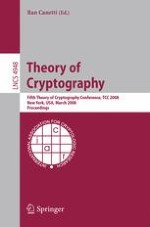2008 | OriginalPaper | Buchkapitel
Equivocal Blind Signatures and Adaptive UC-Security
verfasst von : Aggelos Kiayias, Hong-Sheng Zhou
Erschienen in: Theory of Cryptography
Verlag: Springer Berlin Heidelberg
Aktivieren Sie unsere intelligente Suche, um passende Fachinhalte oder Patente zu finden.
Wählen Sie Textabschnitte aus um mit Künstlicher Intelligenz passenden Patente zu finden. powered by
Markieren Sie Textabschnitte, um KI-gestützt weitere passende Inhalte zu finden. powered by
We study the design of adaptively secure blind signatures in the universal composability (UC) setting. First, we introduce a new property for blind signature schemes that is suitable for arguing security against adaptive adversaries: an
equivocal blind signature
is a blind signature where there exists a simulator that has the power of making signing transcripts correspond to any message signature pair. Second, we present a general construction methodology for building adaptively secure blind signatures: the starting point is a 2-move “equivocal lite blind signature”, a lightweight 2-party signature protocol that we formalize and implement both generically as well as concretely; formalizing a primitive as “lite” means that the adversary is required to show all private tapes of adversarially controlled parties; this enables us to conveniently separate zero-knowledge (ZK) related security requirements from the remaining security properties in the blind signature design methodology. Next, we focus on the suitable ZK protocols for blind signatures. We formalize two special ZK ideal functionalities, single-verifier-ZK (SVZK) and single-prover-ZK (SPZK), both special cases of multi-session ZK that may be of independent interest, and we investigate the requirements for realizing them in a commit-and-prove fashion as building blocks for adaptively secure UC blind signatures. Regarding SPZK we find the rather surprising result that realizing it only against static adversaries is sufficient to obtain adaptive security for UC blind signatures.
We instantiate all the building blocks of our design methodology both generically based on the blind signature construction of Fischlin as well as concretely based on the 2SDH assumption of Okamoto, thus demonstrating the feasibility and practicality of our approach. The latter construction yields the first practical UC blind signature that is secure against adaptive adversaries. We also present a new more general modeling of the ideal blind signature functionality.
